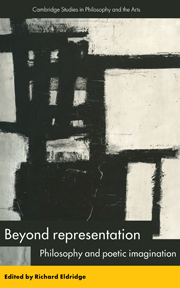Book contents
- Frontmatter
- Contents
- List of contributors
- Editor's acknowledgments
- 1 Introduction: from representation to poiesis
- 2 Confession and forgiveness: Hegel's poetics of action
- 3 The values of articulation: aesthetics after the aesthetic ideology
- 4 In their own voice: philosophical writing and actual experience
- 5 Poetry and truth-conditions
- 6 Fractal contours: chaos and system in the Romantic fragment
- 7 The mind's horizon
- 8 Kant, Hölderlin, and the experience of longing
- 9 Wordsworth and the reception of poetry
- 10 Self-consciousness, social guilt, and Romantic poetry: Coleridge's Ancient Mariner and Wordsworth's Old Pedlar
- 11 Her blood and his mirror: Mary Coleridge, Luce Irigaray, and the female self
- 12 Scene: an exchange of letters
- Index
9 - Wordsworth and the reception of poetry
Published online by Cambridge University Press: 06 July 2010
- Frontmatter
- Contents
- List of contributors
- Editor's acknowledgments
- 1 Introduction: from representation to poiesis
- 2 Confession and forgiveness: Hegel's poetics of action
- 3 The values of articulation: aesthetics after the aesthetic ideology
- 4 In their own voice: philosophical writing and actual experience
- 5 Poetry and truth-conditions
- 6 Fractal contours: chaos and system in the Romantic fragment
- 7 The mind's horizon
- 8 Kant, Hölderlin, and the experience of longing
- 9 Wordsworth and the reception of poetry
- 10 Self-consciousness, social guilt, and Romantic poetry: Coleridge's Ancient Mariner and Wordsworth's Old Pedlar
- 11 Her blood and his mirror: Mary Coleridge, Luce Irigaray, and the female self
- 12 Scene: an exchange of letters
- Index
Summary
Many contemporary literary critics distrust universals. By “universals,” I mean here claims that something is necessary, natural, desirable, or reasonable for all people. Among the several developments contributing to this suspicion of universals, feminist criticism has played a major role. Feminist criticism first began making an impact on academic literary criticism in the 1970s partly because critics like Elaine Showalter, Sandra Gilbert, and Susan Gubar successfully argued that seemingly universal definitions of knowledge and aesthetic value were in fact slanted to fit the point of view and reward the social privileges of men. Debunking fraudulent universals went hand in hand with affirming the differences that these universals had kept in check. Anne Phillips describes the suspicion resulting from “these moves against transcultural, transhistorical, transcendent rationality”:
after so many sightings of the “man” in humanity, many have come to view such abstractions as beyond redemption, and to regard any claims to universality as therefore and inevitably a fraud. Each candidate for universal status has presented itself in sharp contrast to the peculiarities and particularities of local identity, something that delves behind our specificity and difference and can therefore stand in for us all. But the “individual” turns out again and again to be a male household head, the “citizen” a man of arms, the “worker” an assembly line slave. Each gender-neutral abstraction ends up as suspiciously male.
From this point of view, universals invariably function as smokescreens for male domination.
In my opinion, this assault on universals has enabled advances and brought problems. Among the advances, I would count broadening the canon to include writing denigrated by supposedly disinterested aesthetic criteria (such as the ambiguity, complexity, and irony championed by the New Criticism).
- Type
- Chapter
- Information
- Beyond RepresentationPhilosophy and Poetic Imagination, pp. 197 - 215Publisher: Cambridge University PressPrint publication year: 1996

